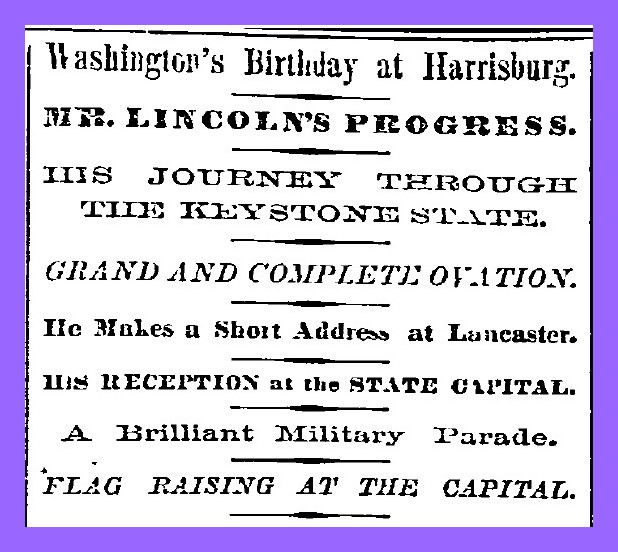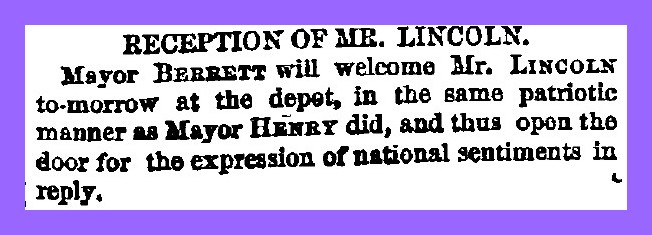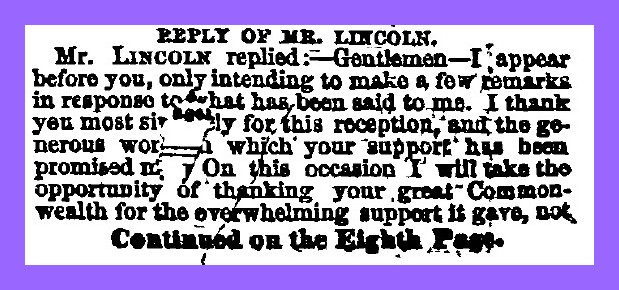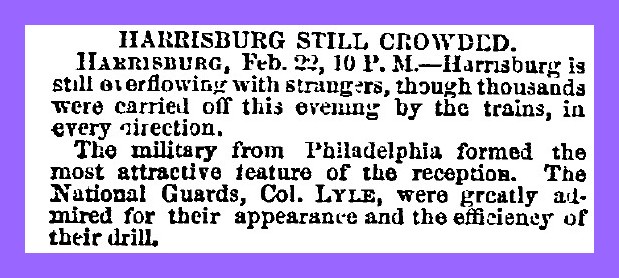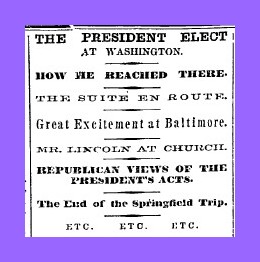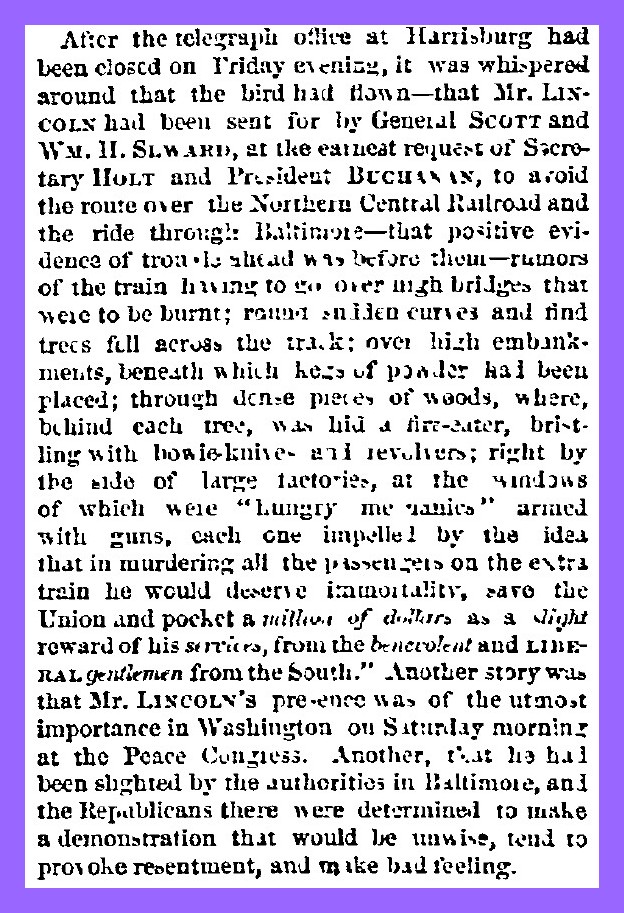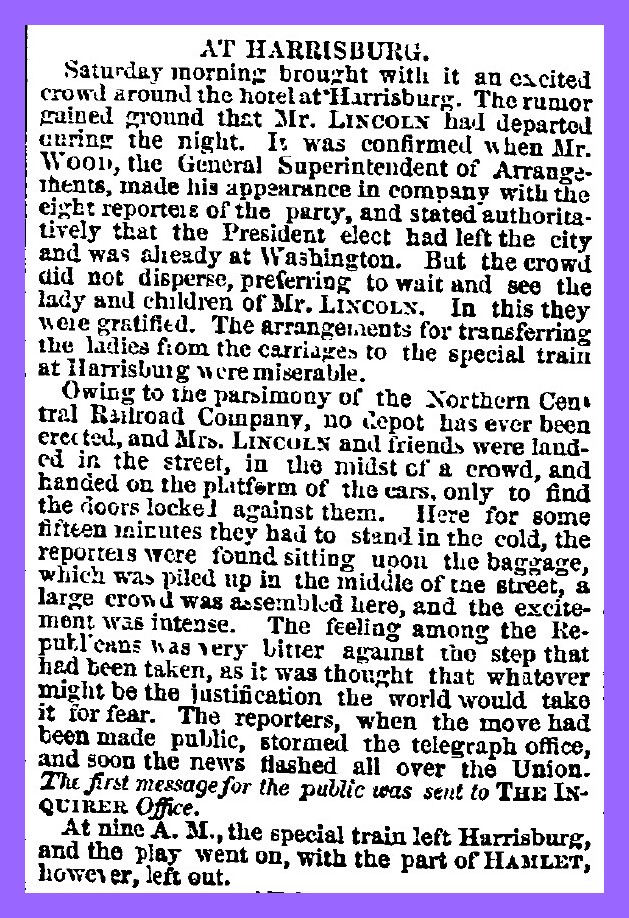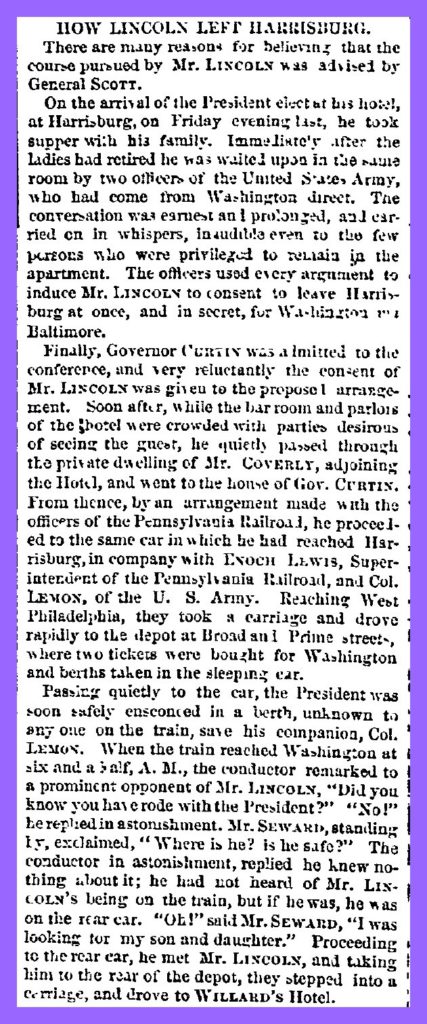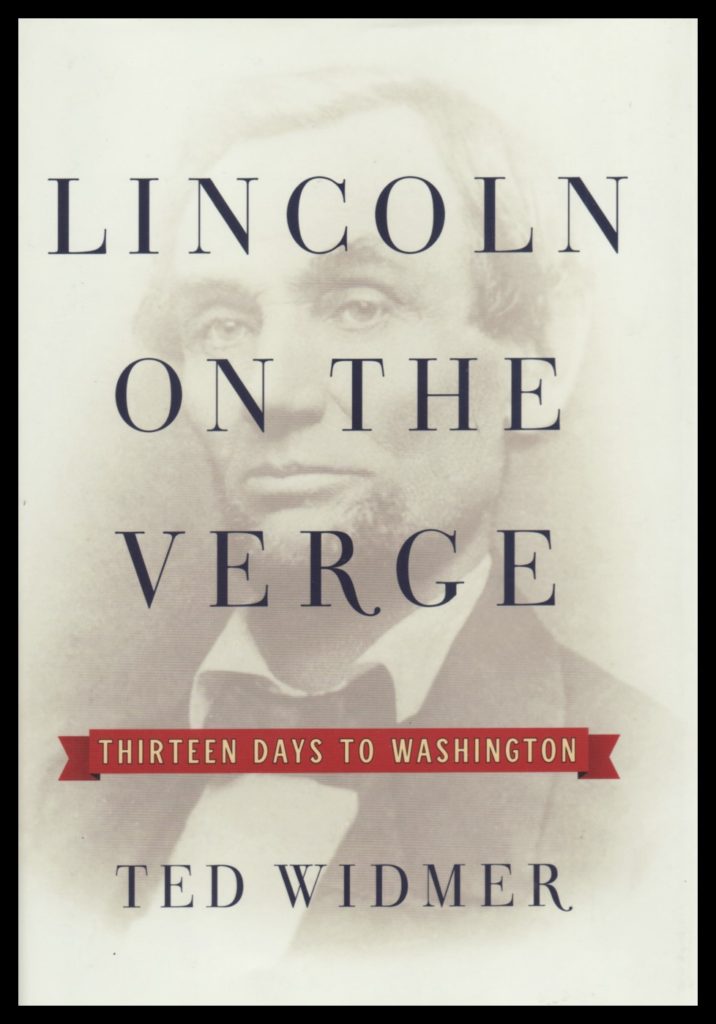One hundred fifty years ago, on his way from his home in Springfield, Illinois, to Washington, D.C. for his March 4th inauguration, President-elect Abraham Lincoln made a stop in Harrisburg, Dauphin County, Pennsylvania. Then, as now, Harrisburg was both the county seat and the state capital.
The plan was for Lincoln to remain in Harrisburg overnight, and then proceed to Washington, D.C. via Baltimore on the Northern Central Railroad. But the belief of some that an assassination was planned en route led to a sudden change of plans. After a number of receptions in his honor on Friday evening, 22 February, Lincoln was secretly hustled out of Harrisburg – some say he was wearing a disguise – and he arrived in Washington at 6:30 the next morning. To do so, he had to retrace his route to Philadelphia via the Pennsylvania Railroad, be carried through Philadelphia streets secretly by carriage to the Broad and Prime Street train station, and then head south through Baltimore and thence to Washington. If he traveled through Baltimore quietly in the middle of the night, he would avoid the expected demonstrations against him as well as the possible assassination attempts that were more likely on the Harrisburg to Baltimore route.
Within a short time of this secret journey, news spread as to what had happened.
The following news reports come from the Philadelphia Inquirer of Saturday, 23 February and Monday, 25 February, 1861.
RECEPTION OF MR. LINCOLN
Mayor Berrett will welcome Mr. Lincoln tomorrow at the depot, in the same patriotic manner as Mayor Henry did, and thus open the door for the expression of national sentiments in reply.
Headlines in the newspaper of 23 February 1861 spoke of the eagerly anticipated arrival of Mr. Lincoln at Harrisburg. Note: Headlines image at top of post.
Washington’s Birthday at Harrisburg
MR. LINCOLN’S PROGRESS
HIS JOURNEY THROUGH THE KEYSTONE STATE
GRAND AND COMPLETE OVATION
He Makes a Short Address at Lancaster
HIS RECEPTION AT THE STATE CAPITAL
A Brilliant Military Parade
FLAG RAISING AT THE CAPITAL
Applause was given when the train from Philadelphia reached Harrisburg at 2:00 P.M.
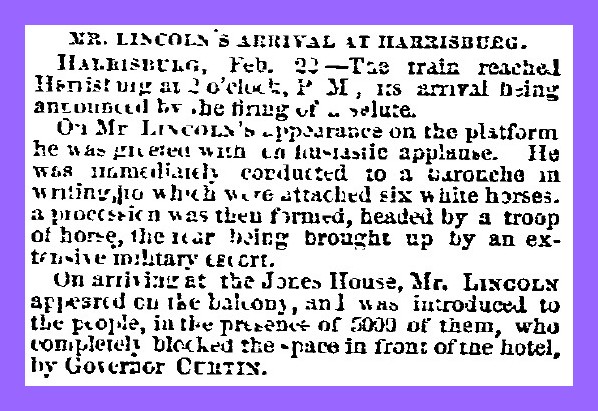
MR. LINCOLN’S ARRIVAL AT HARRISBURG
HARRISBURG, February 22 [1861] — The train reached Harrisburg at 2 o’clock P.M., its arrival being announced by the firing of a salute.
On MR. LINCOLN’S appearance on the platform he was greeted with enthusiastic applause. He was immediately conducted to a barouche in writing, to which were attached six white horses. A procession was then formed, headed by a troop of horse, the rear being brought up by an extensive military escort.
On arriving at the Jones House, MR. LINCOLN appeared on the balcony, wand was introduced to the people, in the presence of 5000 of them, who completely blocked the space in front of the hotel, by Governor CURTIN.
On behalf of the citizens of Pennsylvania, Gov. Andrew Curtin welcomed the President-elect.
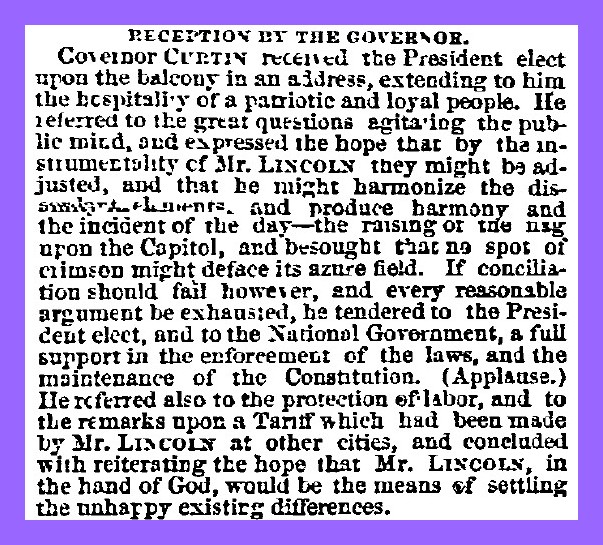
RECEPTION BY THE GOVERNOR
Governor CURTIN received the President elect upon the balcony in an address, extending to him the hospitality of a patriotic and loyal people. He referred to the great questions agitating the public mind, and expressed the hope that by the instrumentality of Mr. LINCOLN they might be adjusted , and that he might harmonize the dissembled elements and produce harmony and the incident of the day — the raising of the flag upon the Capitol, and besought that no spot of crimson might deface its azure field. If conciliation should fail however, and every reasonable argument be exhausted, he tendered to the President elect, and to the National Government, a full support of the enforcement of the laws, and the maintenance of the Constitution. (Applause). He referred also to the protection of labor, and to the remarks upon a Tariff which had been made by Mr. LINCOLN at other cities, and concluded with reiterating the hope that Mr, LINCOLN, in the hand of God, would be the means of settling the unhappy existing differences.
Grateful thanks were given by Lincoln for the warm reception and for the support given by Pennsylvania citizens in the Election of 1860. Was this welcome a good omen of things to come? To the Pennsylvania troops gathered there, he assured them that if they had to be used in war, it would be through no fault of his.
REPLY OF MR. LINCOLN
Mr. LINCOLN replied: — Gentlemen — I appear before you, only intending to make a few remarks in response to what has been said to me. I thank you most sincerely for this reception, and the generous wo——, which your support has been promised —–. On this occasion I will take the opportunity of thanking your great Commonwealth for the overwhelming support it gave, not to me personally, but the cause which I represent, and which I think is a just one, in the late election. (Loud applause.)
Allusion has been made to the fact, perhaps we should say, that I for the first time appear at the Capital of this great Commonwealth of Pennsylvania, upon the birthday of the Father of his Country. In connection with that beloved anniversary, so intimately connected with the history of the country, I have already gone through an exceedingly interesting scene, this morning, in the ceremonies at Philadelphia.
Under the kind conduct of the gentlemen there, I was for the first time allowed the privilege of standing in old Independence Hall (enthusiastic cheering), and to have a few words addressed to me there, affording me an opportunity of expressing myself. I regret that I had not more time to express something of my own feelings, excited by the occasion – something to harmonize and give shape to the sentiments that had really been the sentiments of my whole life. Besides this our friends there had provided a magnificent flag o four country and they had arranged it so I was given the honor of raising it to the head of the staff. (Applause.)
And when it went up, I was pleased that it went to its place by the strength of my own feeble are when, according to the arrangement, the cord was pulled, and it flaunted gloriously to the wind without an accident, in the light-glowing sunshine of the morning. I could not help hoping that there was in the entire success of that beautiful ceremony at least something of an omen of that which is to come. (Loud applause.)
Nor could I help feeling then, as I have often felt, that in the whole of that proceeding I was a very humble instrument. I had not provided the flag. I had not made the arrangement for elevating it to its place. I had applied but a very small portion, even of my feeble strength, in raising it. In the whole transaction I was in the hands of the people who had arranged it, and if I can have the same generous co-operation of the people of this nation. I think the flag of our country may yet to be kept floating gloriously. (Enthusiastic and long continued cheering.)
I never for a moment had to repeat some words I uttere3d at the hotel in regard to what has been said about the military support which the General Government may expect from the Commonwealth of Pennsylvania in an emergency. To guard against any possible mistake of my meaning, do I recur to this. It is not with any pleasure that I contemplate the possibility that a necessity may arise in this country for the use of the military arm. (Applause.)
While I am exceedingly gratified to see the manifestation upon your streets of your military force here, and at your promise to use that force in case of an emergency – while I make this acknowledgment, I desire to repeat, in order to preclude any possible misconstruction, that I do most sincerely hope that we shall have no use for them. (Loud applause) — that it will never become their duty to shed blood, and most especially never to shed fraternal blood — I promise that in so far as I may have the wisdom to direct, that if so painful a result shall in any wise be brought about, it shall be through no fault of mine. (Cheers.)
Allusion has also been made, by one of your honored speakers, to some remarks recently made by myself at Pittsburgh, in regard to what is supposed to be the especial interest of the great Commonwealth of Pennsylvania. I now wish only to say that the few remarks when I uttered on that occasion were remarks which I uttered on that occasion were rather carefully worded. I took pains that they should be so. I have seen no occasion since to add to them or subtract from them. I leave them precisely as they stand (Applause) adding only now that I am pleased to have an expression from you, gentlemen of Pennsylvania, significant that they are satisfactory to you.
And now, gentlemen of the General Assembly of the Commonwealth of Pennsylvania, allow me again to return you my most sincere thanks.
On the way from the outdoor welcoming reception to several hotels where receptions were planned, a man called out to Lincoln and he responded:
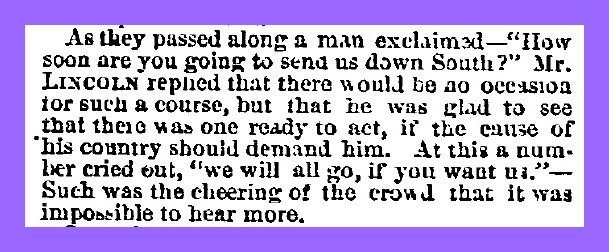
As they passed along a man exclaimed – “How soon are you going to send us down South?” Mr. Lincoln replied that there would be no occasion for such a course, but that he was glad to see that there was one ready to act, if the cause of his country should demand him. At this a number cried out, “we will all go, if you want us.” — Such was the cheering of the crowd that it was impossible to hear more.
Later in the evening, many excited visitors to Harrisburg were still in the city, although some had left on trains going in all directions. It is not known how many from the Lykens Valley area traveled to Harrisburg to get a glimpse of Mr. Lincoln and take part in the celebrations. Trains going north stopped in Millersburg and from there some may have connected with the train heading east to Lykens.
There was no Sunday edition of the Philadelphia Inquirer in 1861, so the citizens had to wait until Monday to read of Lincoln‘s surprise arrival in Washington, D.C. on Saturday morning.
THE PRESIDENT ELECT AT WASHINGTON – HOW HE REACHED THERE
First, there were the whisperings of many. Who made the decision to abandon the plans to spend the night in Harrisburg? What were the rumored plots against Lincoln?
After the telegraph office at Harrisburg had been closed on Friday evening, it was whispered around that the bird had flown — that Mr. LINCOLN had been sent for by General SCOTT and WILLIAM H. SEWARD, at the earnest request of Secretary HOLT and President BUCHANAN, to avoid the route over the Northern Central Railroad and the ride through Baltimore — that positive evidence of trouble ahead was before them — rumors of the train having to go over high bridges that were to be burnt; round sudden curves and find trees fell across the track; over high embarkments, beneath which kegs of powder had been laced; through dense pieces of woods, where behind each tree, was hid a fire-eater, bristling with bowie-knives and revolvers; right by the side of large factories, at the windows of which were “hungry mechanics” armed with guns, each one impelled by the idea that murdering all the passengers on the extra train he would deserve immortality, save the Union and pocket a millions of dollars as a slight reward of his services, from the benevolent and LIBERAL gentlemen from the South.” Another story was that Mr. LINCOLN’s presence was of the utmost importance in Washington on Saturday morning at the Peace Congress. Another, that he had been slighted by the authorities in Baltimore, and the Republicans there were determined to make a demonstration that would be unwise, tend to provoke resentment, and make bad feeling.
Meanwhile, back in Harrisburg, what was the reaction of the crowds there when they heard Lincoln had departed during the night? What of Mrs. Lincoln and the children, and the others who were left in Harrisburg?
AT HARRISBURG
Saturday morning brought with it an excited crowd around the hotel at Harrisburg. The rumor gained ground that Mr. LINCOLN had departed during the night. It was confirmed when Mr. WOOD, the General Superintendent of Arrangements, made his appearance in company with the eight reporters fo the party, and stated authoritatively that the President elect had left the city and was already at Washington. But the crowd did not disperse, preferring to wait and see the lady and children of Mr. LINCOLN. In this they were gratified. The arrangements for transferring the ladies from the carriages to the special train at Harrisburg were miserable.
Owing to the parsimony of the Northern Central Railroad, no depot has ever been erected, and Mrs. Lincoln and friends were landed in the street, in the midst of a crowd, and handed on the platform of the cars, only to find the doors locked against them. Here for some fifteen minutes they were made to stand in the cold, the reporters were found sitting upon the baggage, which was piled up in the street, a large crowd was assembled here, and the excitement was intense. The feeling among the Republicans was very bitter against the step that had been taken, as it was thought that whatever might be the justification the world would take it for fear. The reporters, when the move had been made public, stormed the telegraph office, and soon the news flashed all over the Union. The first message for the public was sent to THE INQUIRER Office.
At nine A.M., the special train left Harrisburg, and the play went on, the the part of HAMLET left out.
The way Lincoln left Harrisburg was then discussed. After being driven from the West Philadelphia depot of the Pennsylvania Railroad to the Broad and Prime Street depot, two sleeping car tickets were purchased for the ride south.
HOW LINCOLN LEFT HARRISBURG
There are many reasons for believing that the course pursued by Mr. LINCOLN was advised by General SCOTT.
On the arrival of the President elect at his hotel, at Harrisburg, on Friday evening last, he took supper with his family. Immediately after the ladies had retired he was waited upon in the same room by two officers of the Unite Stats Army, who had come from Washington direct. The conversation was earnest and prolonged, and carried on in whispers, inaudible even to the few persons who were privileged to remain in the apartment. The officers used every argument to induce Mr. LINCOLN to consent Harrisburg at once, and in secret, for Washington and Baltimore.
Finally, Governor CURTIN was admitted to the conference and very reluctantly the consent of Mr. LINCOLN was given to the proposed arrangement. Soon after, while the bar room and parlors of the hotel were crowded with parties desirous of seeing the guest, he quietly passed through the private dwelling of Mr. COVERLY, adjoining the Hotel, and went to the house of Gov. CURTIN. From thence, by an arrangement made with the officers of the Pennsylvania Railroad, he proceed to the same car in which he had reached Harrisburg, in company the ENOCH LEWIS, Superintendent of the Pennsylvania Railroad, and Col. LEMON, of the U.S. Army. Reaching West Philadelphia, they took a carriage and drove rapidly to the depot at Broad and Prime Streets, where two tickets were bought for Washington and berths taken in the sleeping car.
Passing quietly to the car, the President was soon safely ensconsed in a berth, unknown to any one on the train , save is companion, Col. LEMON. When the train reached Washington at six and a half A.M., the conductor remarked to a a prominent opponent of Mr. LINCOLN, “Did you know you have rode with the President?” “No!” he replied in astonishment. Mr. SEWARD, standing by, exclaimed, “Where is he? Is he safe?” The conductor in astonishment, replied he knew nothing about it; he had not heard of Mr. LINCOLN’s being on the train, but if he was, he was on the rear car. “Oh!” said Mr. SEWARD, “I was looking for my son and daughter.” Proceeding to the read car, he met Mr. LINCOLN, and taking him to the rear of the depot, they stepped into a carriage, and drove to WILLIARD’S Hotel.
Lincoln arrived in Washington at 6:00 A.M. and was driven to the Williard Hotel, where he took breakfast. After the long journey from Springfield, he was finally in Washington to prepare for his inauguration.
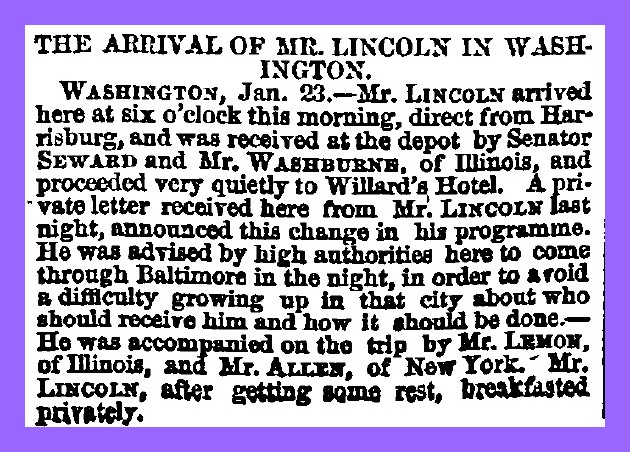
WASHINGTON, January 23 [1861] — Mr. LINCOLN arrived here at six o’clock this morning, direct from Harrisburg, and was received at the depot by Senator SEWARD and Mr. WASHBURNE, of Illinois, and proceeded very quickly to Williard’s Hotel. A private letter received here from Mr. LINCOLN last night, announced this change in his programme. He was advised by high authorities here to come through Baltimore in the night, in order to avoid a difficulty growing up in that city about who should receive him and how it should be done. — He was accompanied on the trip by Mr. LEMON, of Illinois, and Mr. ALLEN, of NEW YORK. Mr. LINCOLN, after getting some rest, breakfasted privately.
_____________________________________
Information for this post was taken from news clippings from the Philadelphia Inquirer, 23 February 1861 and 25 February 1861, found in the on-line resources of the Free Library of Philadelphia. The West Philadelphia station of the Pennsylvania Railroad was in the approximate location of the 30th Street Station in Philadelphia today. The Broad and Prime Street station was at the corner of Broad St. and Washington Avenue, Philadelphia.
Corrections and additional information should be added as comments to this post.
___________________________________
This post originally appeared on the Civil War Blog, March 4, 2011.
Lincoln on the Verge: Thirteen Days to Washington, by Ted Widmer, published by Simon & Schuster in 2020, has a description of Lincoln’s visit to Harrisburg. Widmer cites the original blog post on the Civil War Blog in end note #74.
